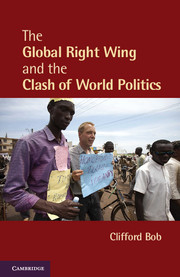1 - Clashing Networks in World Politics
Published online by Cambridge University Press: 05 June 2012
Summary
In the summer of 2003, a handful of beleaguered Brazilians appealed for help from a powerful American rights organization. Menaced by new government initiatives, they believed the foreign group had the expertise, power, and connections to turn back the threat. At its Fairfax, Virginia headquarters, the Americans mobilized, sending a seasoned activist to São Paulo and Rio de Janeiro. On his mission, he gathered facts, met with anxious citizens, and suggested strategies. Soon the Brazilians adopted ideas and approaches the Americans had deployed elsewhere. Ultimately this foreign support helped change the direction of Brazilian law. Meanwhile, the nongovernmental organization (NGO) was busy on other fronts. In the United States, it fought to protect vulnerable citizens at home and abroad. Lobbying Congress, working the courts, and cultivating the media, its operatives crusaded for rights and freedom. At the United Nations, its staff worked with like-minded organizations from other countries to shape international policy. Members of this global network issued press releases, attended conferences, and stressed the moral imperatives of immediate action, not least in Brazil.
In many ways, this might seem an unremarkable story from the age of globalization. Today “local” rights abuses routinely attract overseas concern. Environmental devastation in one region galvanizes action in others. Legislators in the United States and the European Union vote on domestic policies affecting foreign societies. And NGOs use the United Nations, the world media, and the Internet to advance all manner of campaigns.
- Type
- Chapter
- Information
- Publisher: Cambridge University PressPrint publication year: 2012

